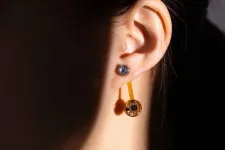(Press-News.org) About The Study: In patients with cryptogenic stroke and evidence of atrial cardiopathy without atrial fibrillation, oral anticoagulant therapy with apixaban did not significantly reduce recurrent stroke risk compared with aspirin in this randomized clinical trial that included 1,015 participants.
Authors: Hooman Kamel, M.D., of Weill Cornell Medicine in New York, is the corresponding author.
To access the embargoed study: Visit our For The Media website at this link https://media.jamanetwork.com/
(doi:10.1001/jama.2023.27188)
Editor’s Note: Please see the article for additional information, including other authors, author contributions and affiliations, conflict of interest and financial disclosures, and funding and support.
# # #
Media advisory: This study is being released to coincide with presentation at the International Stroke Conference 2024.
Embed this link to provide your readers free access to the full-text article This link will be live at the embargo time https://jamanetwork.com/journals/jama/fullarticle/10.1001/jama.2023.27188?guestAccessKey=8dbc1dfe-3156-41b0-bc51-06e41924a613&utm_source=For_The_Media&utm_medium=referral&utm_campaign=ftm_links&utm_content=tfl&utm_term=020724
END
Apixaban to prevent recurrence after cryptogenic stroke in patients with atrial cardiopathy
JAMA
2024-02-07
ELSE PRESS RELEASES FROM THIS DATE:
MD Anderson research highlights for February 7, 2024
2024-02-07
HOUSTON ― The University of Texas MD Anderson Cancer Center’s Research Highlights showcases the latest breakthroughs in cancer care, research and prevention. These advances are made possible through seamless collaboration between MD Anderson’s world-leading clinicians and scientists, bringing discoveries from the lab to the clinic and back.
Recent developments at MD Anderson include a combination treatment for patients with acute myeloid leukemia (AML), the discovery of a molecular driver in metastatic breast cancer, an oral combination therapy for high-risk myelodysplastic syndromes (MDS) and chronic myelomonocytic leukemia (CMML), a novel method to mechanically destroy ...
UW-developed smart earrings can monitor a person’s temperature
2024-02-07
Smart accessories are increasingly common. Rings and watches track vitals, while Ray-Bans now come with cameras and microphones. Wearable tech has even broached brooches. Yet certain accessories have yet to get the smart touch.
University of Washington researchers introduced the Thermal Earring, a wireless wearable that continuously monitors a user’s earlobe temperature. In a study of six users, the earring outperformed a smartwatch at sensing skin temperature during periods of rest. It also showed promise for monitoring signs of stress, eating, exercise and ovulation.
The smart earring prototype is about ...
Quantum simulation with ultracold fermions unveils pairing pseudogap
2024-02-07
A research team led by Professors PAN Jianwei, YAO Xingcan, and CHEN Yu'ao from the University of Science and Technology of China (USTC) of the Chinese Academy of Sciences, have for the first time observed and quantitatively characterized the many-body pairing pseudogap in unitary Fermi gases. This achievement, pursued by the ultracold atomic community for nearly two decades, resolves longstanding debates regarding the existence of a pairing pseudogap in these gases. It also supports ...
New research uncovers biological drivers of heart disease risk
2024-02-07
New gene mapping technique reveals how genetic alterations in cells lining blood vessels contribute to coronary artery disease, with implications for diagnostic and treatment strategies.
KEY TAKEAWAYS
Researchers from the Brigham, the Broad Institute, and Stanford Medicine studied how "deleting" individual genes associated with coronary artery disease (CAD) impacted the expression of all the other genes in a cell to better understand underlying biology of CAD.
The study focused on endothelial cells, which line blood vessels and are increasingly understood to influence CAD risk.
The researchers highlighted a previously unrecognized role for the TLNRD1 gene ...
Resting boosts performance of lithium metal batteries
2024-02-07
Next-generation electric vehicles could run on lithium metal batteries that go 500 to 700 miles on a single charge, twice the range of conventional lithium-ion batteries in EVs today.
But lithium metal technology has serious drawbacks: The battery rapidly loses its capacity to store energy after relatively few cycles of charging and discharging – highly impractical for drivers who expect rechargeable electric cars to operate for years.
Scientists have been testing a variety of new materials and techniques to improve the battery’s cycle life. Now, Stanford University researchers have discovered a low-cost solution: simply drain the battery and let it rest for several hours. ...
Machine learning models for predicting disability and pain following lumbar disc herniation surgery
2024-02-07
About The Study: The findings of this study including 22,000 surgical cases suggest that machine learning models can inform about individual prognosis and aid in surgical decision-making to ultimately reduce ineffective and costly spine care.
Authors: Bjørnar Berg, Ph.D., of Oslo Metropolitan University in Oslo, is the corresponding author.
To access the embargoed study: Visit our For The Media website at this link https://media.jamanetwork.com/
(doi:10.1001/jamanetworkopen.2023.55024)
Editor’s ...
Using cancer’s strength to fight against it
2024-02-07
Current immunotherapies work only against cancers of the blood and bone marrow
T cells engineered by Northwestern and UCSF were able to kill tumors derived from skin, lung and stomach in mice
Cell therapies can provide long-term immunity against cancer
CHICAGO --- Scientists at the UC San Francisco (UCSF) and Northwestern Medicine may have found a way around the limitations of engineered T cells by borrowing a few tricks from cancer itself.
By studying mutations in malignant T cells that cause lymphoma, they zeroed in on one that imparted ...
Trends in stroke thrombolysis care metrics and outcomes by race and ethnicity
2024-02-07
About The Study: In this study of more than 1 million patients with stroke, the Target: Stroke quality initiative was associated with improvement in thrombolysis frequency, timeliness, and outcomes for all racial and ethnic groups. However, disparities persisted, indicating a need for further interventions.
Authors: Gregg C. Fonarow, M.D., of the University of California, Los Angeles, is the corresponding author.
To access the embargoed study: Visit our For The Media website at this link ...
New direct links discovered between the brain and its surrounding environment
2024-02-07
In a recent study of the brain’s waste drainage system, researchers from Washington University in St. Louis, collaborating with investigators at the National Institute of Neurological Disorders and Stroke (NINDS), a part of the National Institute of Health (NIH), discovered a direct connection between the brain and its tough protective covering, the dura mater. These links may allow waste fluid to leave the brain while also exposing the brain to immune cells and other signals coming from the dura. This challenges the conventional wisdom which has suggested that the brain is cut off from its ...
Stress influences brain and psyche via immune system
2024-02-07
Chronic stress has far-reaching consequences for our bodies. For example, many stress-related psychiatric illnesses such as depression are associated with changes in the immune system. However, the underlying mechanisms of how these changes affect the brain are still largely unknown.
Enzyme from immune cells in the blood affects nerves in the brain
An international research team led by the University of Zurich (UZH), and the University Hospital of Psychiatry Zurich (PUK) and the Icahn School of Medicine at Mount Sinai, New York, has now uncovered a novel mechanism. “We were able to show that ...
LAST 30 PRESS RELEASES:
A promising potential therapeutic strategy for Rett syndrome
How time changes impact public sentiment in the U.S.
Analysis of charred food in pot reveals that prehistoric Europeans had surprisingly complex cuisines
As a whole, LGB+ workers in the NHS do not experience pay gaps compared to their heterosexual colleagues
How cocaine rewires the brain to drive relapse
Mosquito monitoring through sound - implications for AI species recognition
UCLA researchers engineer CAR-T cells to target hard-to-treat solid tumors
New study reveals asynchronous land–ocean responses to ancient ocean anoxia
Ctenophore research points to earlier origins of brain-like structures
Tibet ASγ experiment sheds new light on cosmic rays acceleration and propagation in Milky Way
AI-based liquid biopsy may detect liver fibrosis, cirrhosis and chronic disease signals
Hope for Rett syndrome: New research may unlock treatment pathway for rare disorder with no cure
How some skills become second nature
SFU study sheds light on clotting risks for female astronauts
UC Irvine chemists shed light on how age-related cataracts may begin
Machine learning reveals Raman signatures of liquid-like ion conduction in solid electrolytes
Children’s Hospital of Philadelphia researchers emphasize benefits and risks of generative AI at different stages of childhood development
Why conversation is more like a dance than an exchange of words
With Evo 2, AI can model and design the genetic code for all domains of life
Discovery of why only some early tumors survive could help catch and treat cancer at very earliest stages
Study reveals how gut bacteria and diet can reprogram fat to burn more energy
Mayo Clinic researchers link Parkinson's-related protein to faster Alzheimer's progression in women
Trends in metabolic and bariatric surgery use during the GLP-1 receptor agonist era
Loneliness, anxiety symptoms, depressive symptoms, and suicidal ideation in the all of us dataset
A decision-support system to personalize antidepressant treatment in major depressive disorder
Thunderstorms don’t just appear out of thin air - scientists' key finding to improve forecasting
Automated CT scan analysis could fast-track clinical assessments
New UNC Charlotte study reveals how just three molecules can launch gene-silencing condensates, organizing the epigenome and controlling stem cell differentiation
Oldest known bony fish fossils uncover early vertebrate evolution
High‑performance all‑solid‑state magnesium-air rechargeable battery enabled by metal-free nanoporous graphene
[Press-News.org] Apixaban to prevent recurrence after cryptogenic stroke in patients with atrial cardiopathyJAMA

